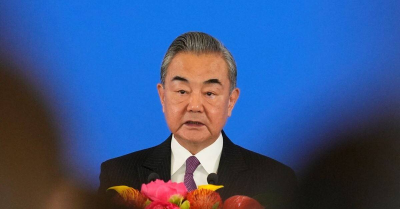Reuters-China warns against maritime camp confrontations but stops short of naming US
November 8, 2023 3 min 448 words
中国外交部长王毅近日发表讲话,呼吁通过谈判解决海上争端,并警告要避免"阵营"对峙,但未点名美国。这一表态发生在中美领导人预计将举行会晤之前,而菲律宾、日本和美国一直抱怨中国在南中国海的侵略行为。王毅的讲话,以和平友好的方式解决历史性的海上争端是明智之举,但没有点名美国并未能解决问题的根本。中国应该更积极地采取措施来减轻紧张局势,而不仅仅是避免点名国家。此外,他提到的危机沟通机制需要改进,这是一个重要的举措。然而,中国应该认真考虑与争端相关国家的对话,以找到和平解决争端的途径。中国的行动将影响整个地区的稳定和和平,因此应该在这一问题上展现出更多的建设性和透明性,以建立信任和缓解紧张局势。这也有助于维护国际法和自由航行的原则。
China's foreign minister, Wang Yi, said maritime disputes should be resolved through talks and warned against "camp" confrontations, but stopped short of naming the United States, days before an expected meeting between the countries' leaders.
The Philippines, Japan and the United States have complained about what they say is growing Chinese aggression in the South China Sea. Beijing says most of the region is part of its territory, a claim that is hotly disputed by several littoral nations.
Last month, China and the Philippines traded barbs over a collision in the South China Sea as Chinese vessels blocked the passage of Philippine ships. Beijing said the vessels were "trespassing" on Chinese territory when trying to send supplies to Philippine troops stationed on a disputed shoal, which lies in the Philippines' exclusive economic zone.
The tense encounters between China and the Philippines at the contested shoal have led Japan to call for trilateral cooperation with the United States on helping Manila bolster its security capabilities.
"Historical maritime disputes should be resolved through friendly consultation between direct parties, and maritime camp confrontations and zero-sum games should be resisted," Wang said at a symposium on maritime governance in Hainan on Tuesday, without identifying any nation.
Crisis communication mechanisms should also be improved, Wang said, without referring to the incidents.
China has long criticised what it labels as "cliques" among nations, especially countries that have no direct claims in disputes. Beijing has been especially critical of the U.S. Indo-Pacific strategy, which identifies China as an aggressor in the region, including the South China Sea, undermining international maritime law including freedom of navigation.
Last year, at the same symposium, Wang said a "certain major country" created the Indo-Pacific strategy, put together exclusive "small circles", and doubled down on "provocative" close-range manoeuvres and muscle-flexing.
But in his remarks on Tuesday, Wang took a more dovish tone and avoided overt references to the United States, amid broader bilateral efforts to ease tensions and days ahead of an expected meeting between Chinese President Xi Jinping and U.S. President Joe Biden on the sidelines of an upcoming Asia-Pacific Economic Cooperation (APEC) forum.
China will continue to fulfil its obligations under international maritime laws, including the United Nations Convention on the Law of the Sea (UNCLOS), Wang said, again without referring to Washington.
A year earlier, he had criticised the "certain major country" for refusing to join UNCLOS, of which more than 160 countries are parties. The United States, while accepting the UNCLOS, has yet to ratify it.

